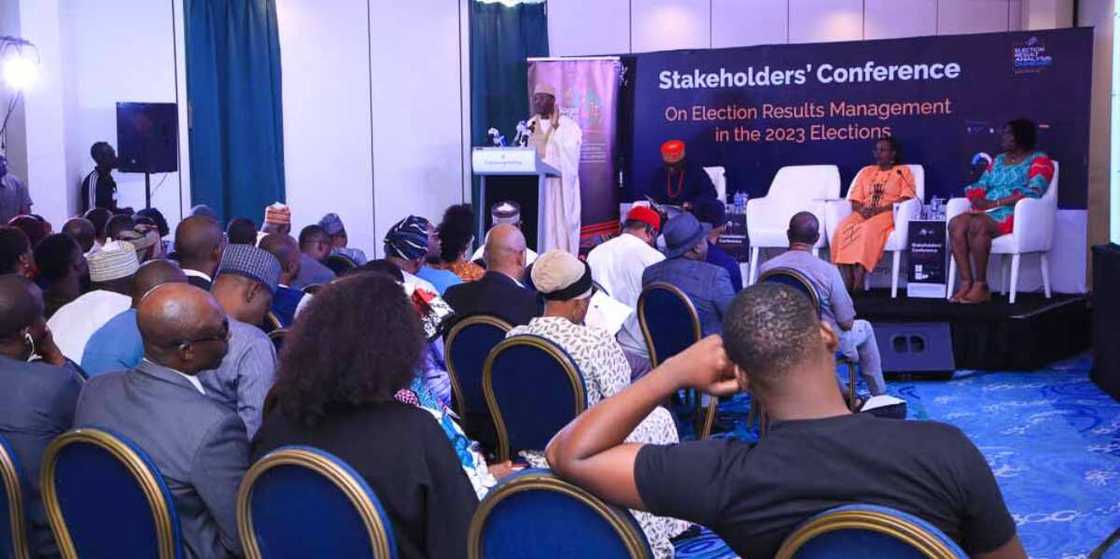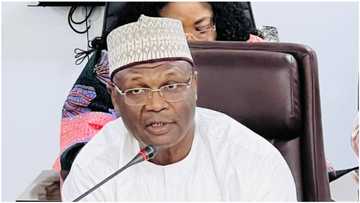2023 Polls: 22 Innovations Introduced by INEC That Will Make Rigging Difficult for Politicians
- In a build-up to the 2023 polls, INEC and other stakeholders have continued to intensify efforts to ensure a seamless election
- INEC chairman, Professor Mahmood Yakubu has vowed that there will be no room for electoral fraud
- He said the commission has introduced 22 new innovations to combat and impede on any imminent attempt at fraud during polls
FCT, Abuja - Chairman of the independent national electoral commission (INEC), Professor Mahmood Yakubu said the commission is gallantly ready to hold the upcoming general elections in 2023.
The INEC chairman made this known on Friday, September 9 at the Transcorp Hilton in Abuja during a stakeholders' conference on election result management and the launch of the election result analysis dashboard (ERAD) report agenda.

Source: Twitter
While delivering his keynote address at the conference attended by Legit.ng regional correspondent, Prof, Yakubu said the commission has introduced 22 new innovations to combat electoral fraud ahead of the 2023 general elections.

Read also
2023 elections in danger as INEC discloses "repeated attempts to break through our cyber security"
As gathered by Legit.ng, below are the lists of the 22 innovations introduced by INEC to combat electoral fraud.
PAY ATTENTION: Subscribe to Digital Talk newsletter to receive must-know business stories and succeed BIG!
We've introduced new tech-solution to combat electoral fraud - INEC
1. Biometric registration
Use of biometric technology in identifying voters. Initially, only fingerprints were used but in 2021 facial recognition was introduced.
2. Computer-based registration of voters
Direct Data Capture Machines (DDCM) is a laptop computer-based registration equipment introduced in 2007 but fully deployed in 2011.
It was replaced in 2021 by a tablet-type device, the INEC Voter Enrolment Device (IVED).
3. Permanent Voters’ Card (PVC) with chip
A chip-based, machine-readable voters card was introduced in 2015 which made it possible to use an electronic device to positively identify a voter using fingerprints.
4. Online pre-registration of voters (2021)
A dedicated portal to enable registrants and other voters with issues concerning their registration to commence the process online and complete it in person at a registration centre.
5. Smart Card Reader (SCR)
An electronic device that reads the PVC and the fingerprint of voters to authenticate them before voting.
6. Bimodal Voter Accreditation System (BVAS)
BVAS was introduced in 2021 to replace the SCR. It is capable of not only reading fingerprints but also facial recognition. It is also much faster than the SCR.
This has vastly increased the positive identification of voters during accreditation.
7. NEC Results Viewing Portal
This is a dedicated portal for the public to view images of polling unit results as soon as they are ready.
Once a person registered and is verified, he/she can view polling unit results by logging in to the results viewing portal. This has increased transparency in the process.
8. Uploading of results in real-time using the BVAS
The BVAS doubles as an accreditation device and a photographic device to capture the picture of results and upload them to the IReV.
9. Collation Support and Results Verification System (CSRVS)
The CSRVS provides support to Collation and Returning Officers during the compilation and announcement of results.
Using carefully prepared Excel sheets and files, CSRVS helps to confirm figures from manual collation and speeds up the process of results management.
10. Online portals for candidates, observers and political party agents
Dedicated portals for management of candidates, media, observers and party agents.
This was informed by the COVID-19 pandemic, but they have also increased the efficiency of managing these activities.
11. Situation Room
The INEC Situation Room at Headquarters was introduced in 2011.
From the Situation Room, the Commission can monitor and supervise elections in real-time using technology.
In 2020, the Commission introduced the Virtual Situation Room, which also enables the public to join the INEC Situation Room virtually. State-level Situation Rooms also exist.
12. Election Monitoring and Support Centre
Election Monitoring and Support Centre (EMSC) uses computer applications and dashboards to monitor and support election day activities.
13. Compliance and Threat Data Acquisition and Sharing System
Compliance and Threat Data Acquisition and Sharing System uses real-time electronic data gathering to monitor and solve challenges during elections.
14. Security Alert and Notification System
INEC Security Alert and Notification System (INEC SANS) uses an Android application and web dashboard to monitor and respond to physical threats to INEC activities and facilities.
15. Basic Security in Election Duty
Basic Security in Election Duty (BaSED) is an electronic security training and certification module for election duty staff.
16. Election Risk Management Tool
Election Risk Management Tool (ERMT) is a specialized tool for tracking election risks and managing them.

Read also
Full list of the 2019 presidential election results: How APC, PDP, Labour Party, others performed
17. Citizen’s engagement and voter education
There are several INEC social media platforms as well as the INEC Citizens Contact Centre which uses technology to receive and respond to public requests for information.
18. Election Violence Mitigation and Advocacy Tool
Election Violence Mitigation and Advocacy Tool (EVMAT) is an electronic data gathering tool used by the Electoral Institute for research on election violence.
19. TEI Virtual Library
Fully equipped digital library at the Electoral Institute to support research and institutional memory.
20. Operations Management Information System (OMIS)
Operations Management Information System (OMIS) is a database of election information, including election staff data, election results and other election management information.
21. Logistics Management System
Logistics Management System uses an Android application and web dashboard to track election materials from procurement to delivery.
22. INEC Portal for Recruitment of Election Staff
INEC Portal for Recruitment of Election Staff is an online election staff recruitment and deployment system. It also has an Android application to provide multiple access to potential election staff.
INEC: Final decision made on staff who swore an affidavit in favour of Lawan
In another development, INEC has disowned an unnamed staff who has reportedly sworn an affidavit on the crisis in the Yobe North senatorial district.
The commission's spokesperson, Festus Okoye, reiterated the position of INEC that the report of its monitoring team remains valid and determines its decision.
The APC has submitted the name of Lawan in which Machina was announced the winner of the primary, but the court document showed that the staff confirmed another primary was conducted, and Lawan won.
Source: Legit.ng






